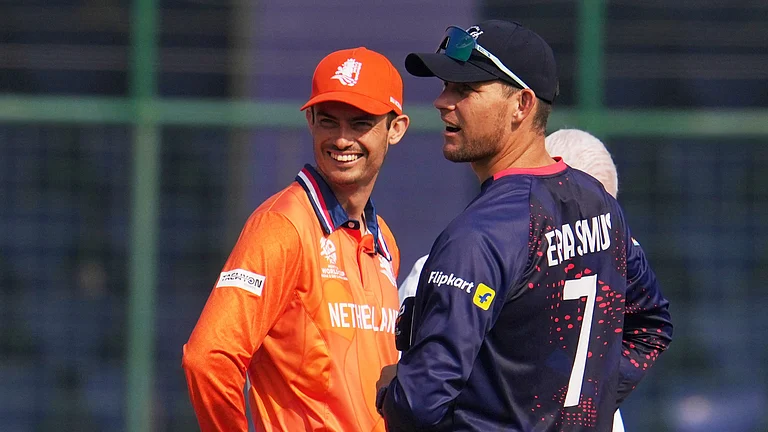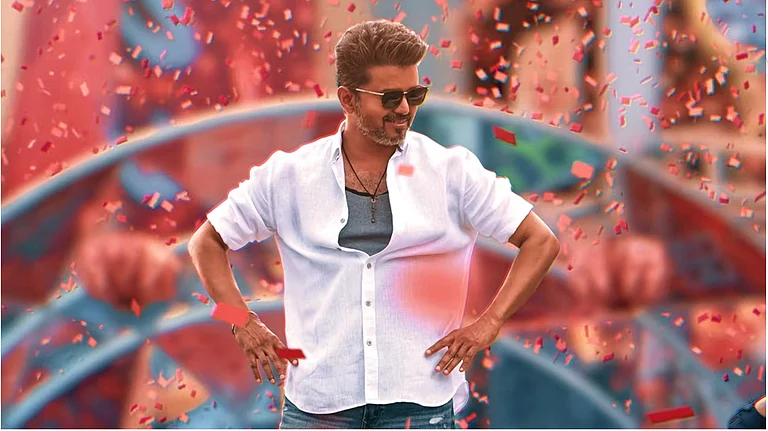And just in case one thought that the Left was back to its equivocal ways, Basu elaborated in Murshidabad, two days later, on September 10: "The Congress can never be our friend because it is our enemy no. 1 in West Bengal. But due to the recent shifts in national politics my party favours supporting the Congress."
Three-and-a-half decades after a motley group of Communists, including an ambitious, London-educated apparatchik named Jyoti Basu, walked out of the undivided Communist Party Of India (CPI), fuming at its "nakedly reformist" pro-Congress stand, the wheel has turned a full circle. Forgotten is the struggle against revisionism that was promised while carving out the CPI(M).
Of late, Basu and gerontocrat CPI(M) general secretary Harkishen Singh Surjeet are rooting for the Congress with a feeble rider: vote for the Congress where the Left is absent.
The provocation, obviously, is the CPI(M)s discovery of its "enemy number one": the "barbaric" BJP (Basus acerbic description of the party). At the CPI(M)s 16th congress in Calcutta last year the old guard, led by the Basu-Surjeet duo, effectively triumphed in their advocacy of a tilt towards the Congress by saying that the partys "central contradiction" was with the BJPa "political wing of the fascist rss." This effectively left the young, but more hardline Prakash Karat-Sitaram Yechury group, which espoused a "policy of equidistance from both the Congress and the BJP", in the lurch. Says Anil Biswas, the powerful CPI(M) central committee member: "Maintaining equidistance now would mean helping the BJP."
Detractors, however, sneer at the CPI(M)s cosying up to the Congress. According to them, this has more to do with the partys increasing marginalisation in Indian politics. Particularly, in view of its dashed hopes (thanks to the demise of the rag-tag third front) of filling up the political vacuum created by the rapid electoral decline of the Congress. A survey conducted by the Delhi-based Centre for Studies in Developing Societies shows that the total voteshare of the CPI(M)-led Left Front dropped from 10.2 per cent in 1989 to 7.8 per cent during the 1998 general elections. The BJP, on the other hand, has managed to bag 25.5 per cent of the vote last year, a big jump from the 11.5 per cent it got in 1989.
Seen in this context, the CPI(M)s supposed consolidation is another name for stagnation. For instance, though the largest Communist party bagged 32 of the 71 seats it contested in 20 states and Union territories in last years general election, all of them were from West Bengal, Kerala and Tripura, the partys tried and tested turfs. So its truck with the Congress looks more like a pragmatic ploy for survival rather than any spirited ideological move. "It is both opportunism and pragmatism," says Pradip Bose, a political scientist at Calcuttas renowned Centre For Studies in Social Sciences.
And this manifests in a bizarre election campaign bereft of any cohesive national approach from a once-politically principled party. Even as the point, about supporting a non-Left secular candidate in constituencies where the Left is absent, was being taken, the ageing West Bengal chief minister added: "Our main purpose is to prevent the BJP from coming to power. But we also do not want the Congress in Delhi." Confusing the frazzled audience further, Basu continued: "There will be another fractured mandate and yet another coalition government. We are going to emerge stronger and continue to be independent of the Congress and the BJP."
Four days later, politburo honcho Sitaram Yechury added his bit of self-justifying verbal calisthenics by telling a luncheon gathering at a stylish south Calcutta home: "We are actually contesting the Congress in many states. Our priority, of course, is to defeat the communal forces."
Far away, across the Vindhyas, Surjeet, the indefatigable votary of the CPI(M)-Congress entente, got entangled in this web of doublespeak and duplicity with embarrassing consequences. In Nagercoil, Tamil Nadu, the hoary Communist found himself sharing a platform with the local Congress candidate. The next day, barely 50 km away in the neighbouring state capital of Thiruvananthapuram, he tore the Congress apart in a state where the Left and the Congress have been traditional political enemies. Quizzed by journalists on this spectacular somersault, the CPI(M) general secretary offered a lame excuse: "I did not campaign for the Congress candidate. I addressed a CPI(M) public meeting and he came to the venue."
Surjeets declarations at a press conference threw up conundrums which would flummox any political pundit: yes, the CPI(M) would accept Congress support in forming a third front government; well, it was premature to say when the CPI(M) would support a Congress-led government; no, the CPI(M) did not have an alliance with the Congress; yes, it had made seat adjustments with the Congress. Such un-realpolitik doesnt find many takers in the Congress itself. Asks a bemused Pranab Mukherjee: "What is the sense of asking the Left to support us in places where it simply does not exist?"
Unsurprisingly, the CPI(M) workers in Kerala are unhappy with their party sleeping with the enemy outside its bastions. In West Bengal, the party is concerned that the 40-odd per cent of votes, which traditionally goes to the Congress, could move en bloc to a more cohesive Trinamul-BJP combine. An independent field study conducted by political scientists has already predicted a 10 per cent erosion of Left votes. Half a dozen disgruntled Congress leaders have moved over to the Trinamul in the run-up to the election, complaining that their partys cooption had stripped it of all its credibility.
In Bhagalpur, Bihar, some local Congressmen faxed a strong letter of protest to the Congress Working Committee after some of its overenthusiastic workers joined the campaign procession of local CPI(M) candidate Subodh Roy. Some Congressmen, however, are more happy than bothered with the CPI(M) support. Says West Bengal Congress leader Sougata Roy: "The fact that a party like CPI(M), built on anti-Congressism, has to support the Congress shows that we are a real secular force."
The CPI(M)s semantics of support, however, have started sounding fuzzy and unconvincing. In Bhagalpur, Yechury told newsmen: "This is not an alliance. This is temporary support. We are looking at the reality of a third front."
Is the CPI(M) now trapped in a confusion of its own making and a web of deceitful and convoluted alliances? Left politics expert Shankar Ghosh is certain about the shape of things to come: "Jyoti Basu has to join hands with the Congress and support it. If you regard communalism as your main enemy, where is the question of equidistance? The sooner the party accepts this stark reality the better." At stake, clearly, is the credibility of the Left Front. But dreams die hard for the CPI(M)even while it breaks bread and sleeps with the "enemies of class struggle"


























